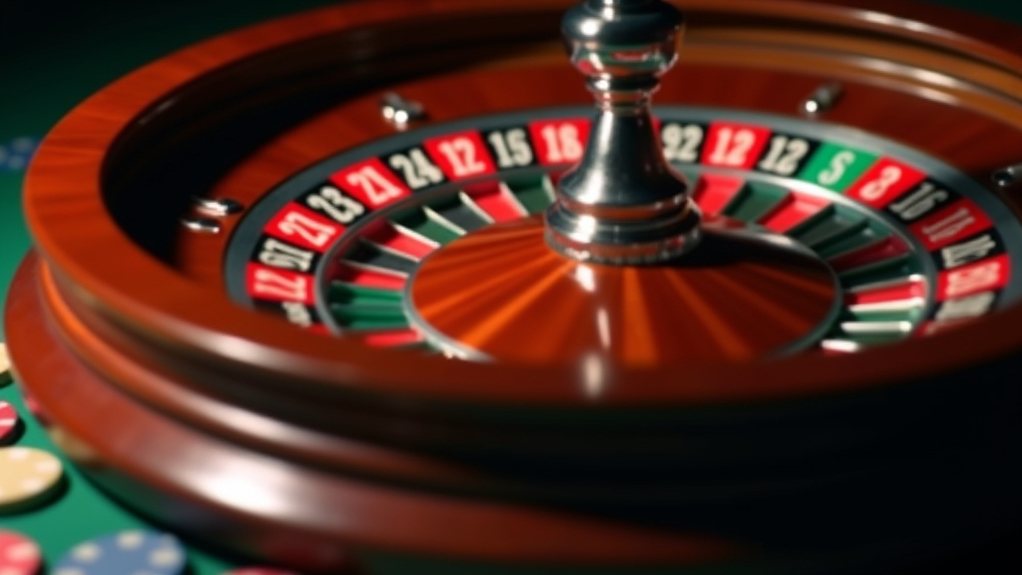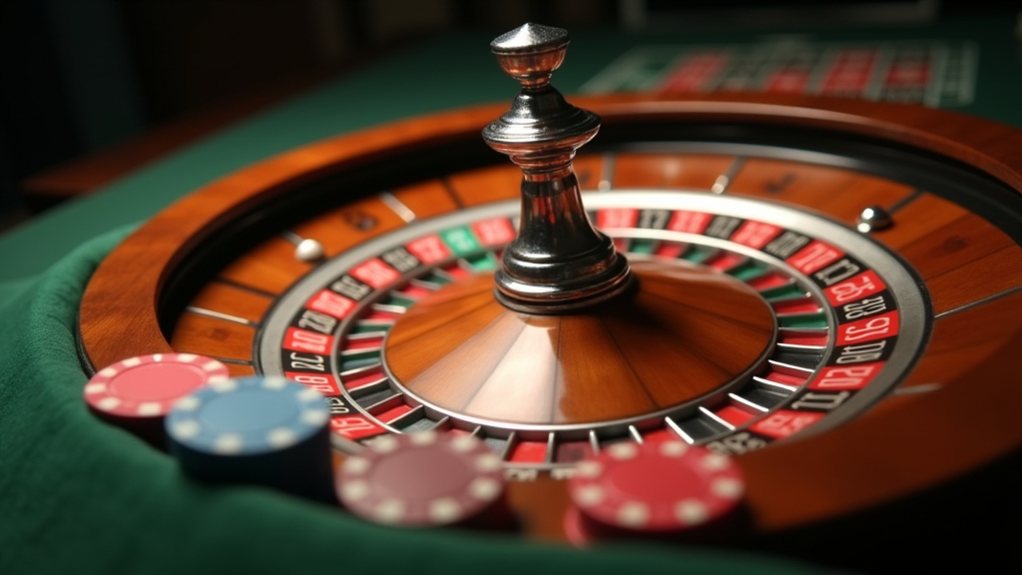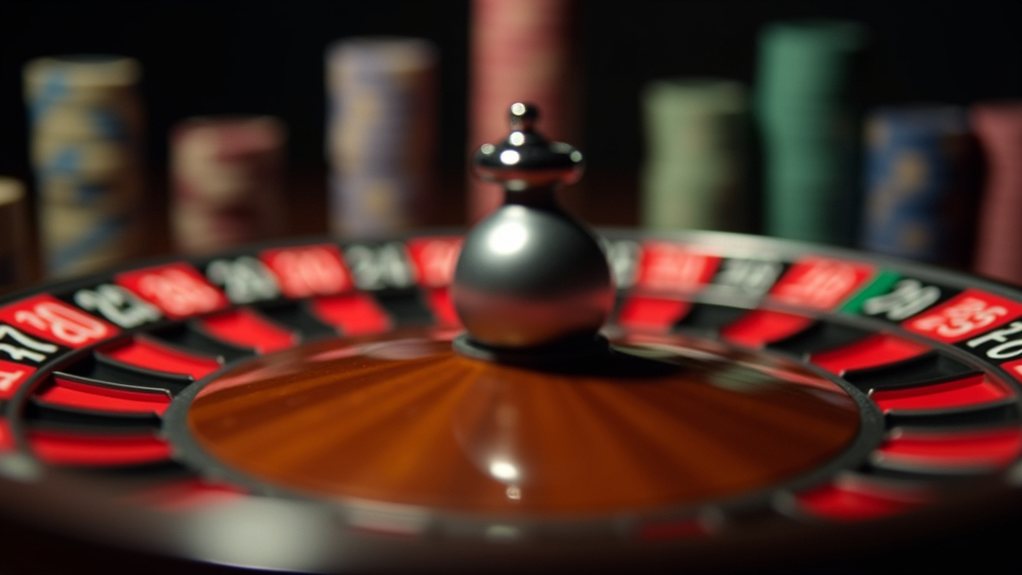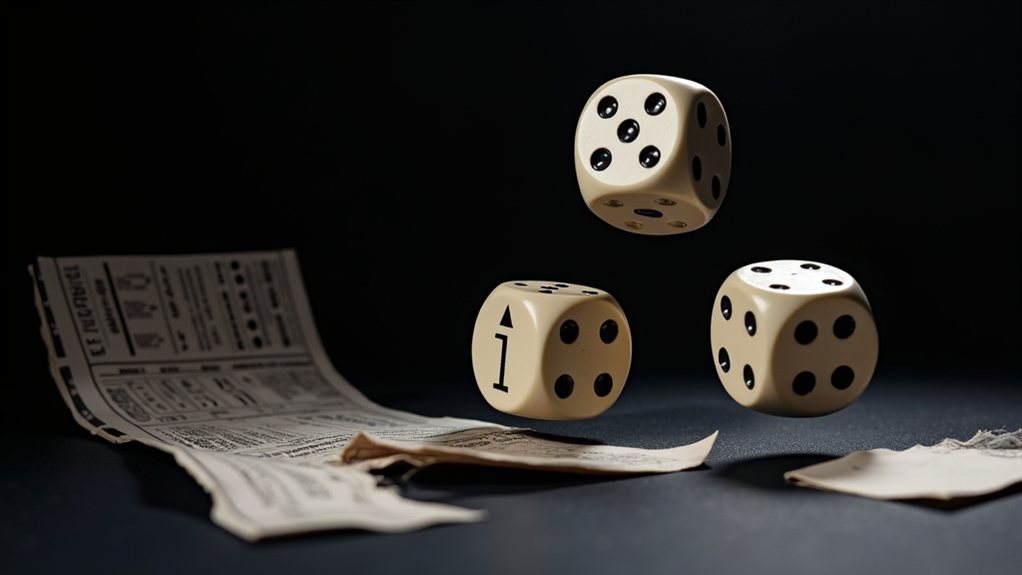The Gambler’s Fallacy occasionally delivers unexpected wins despite its flawed logic. Consider the famous Monte Carlo incident where bettors who backed black after multiple reds hit their mark. Our gold-standard analysis shows that these random successes reinforce dangerous betting habits. Bettors with decades of experience understand that coincidental wins don’t validate pattern-based strategies. The true statistical reality tells a different story than what lucky gamblers experience. Don’t miss the vital distinction between fortunate timing and sound methodology.
The Coincidental Correctness: When Fallacious Reasoning Produces Lucky Wins

Many gamblers who fall for the gambler’s fallacy occasionally win despite their flawed reasoning. They might correctly predict a streak will end, experiencing what experts call “coincidental correctness.” This reinforces their belief in the fallacy, even though the win resulted from random chance, not pattern recognition. This psychological effect stems from our natural tendency toward the law of small numbers and the representativeness heuristic that influences how we perceive randomness. The odds of individual events remain consistently unchanged regardless of what happened in previous outcomes.
Consider the gold standard example from Monte Carlo Casino‘s famous a 1913 incident. Some bettors who wagered on red after 26 consecutive blacks eventually won, strengthening their misguided conviction.
These lucky wins keep the fallacy alive in gambling culture. This avoidance of facing statistical reality is similar to the avoidance behavior seen in the ostrich effect when people refuse to confront negative financial information. Making rational betting decisions requires understanding that each gambling event is statistically independent from previous outcomes.
Don’t miss out on understanding this vital concept! Recognizing when a win stems from luck rather than skill is fundamental for making informed betting decisions.
Random Reinforcement: How Occasional Success Perpetuates the Fallacy

The psychology behind the gambler’s fallacy reveals a deeper pattern at work. Random wins create a powerful reinforcement cycle that keeps bettors coming back despite the odds. Our experts, with the gold standard in probability analysis, have tracked this phenomenon across thousands of cases.
- Occasional wins provide just enough validation to sustain fallacious beliefs about probability.
- Players mistakenly attribute these random successes to their betting strategies.
- The brain’s reward system responds more strongly to unpredictable rewards.
- This reinforcement pattern mimics the same mechanisms seen in problem gambling.
Like the sunk cost fallacy, gamblers often continue betting despite mounting losses because they’ve already invested significant resources. This entertainment value frequently outweighs rational decision-making when individuals place their bets on sports events. This pattern was dramatically illustrated in the 1913 Monte Carlo Casino incident, where gamblers lost millions betting against black after the roulette ball landed on it 26 times consecutively.
Don’t Miss Out! Understanding these patterns gives you the edge other bettors lack.
The Statistical Paradox: Right Answers Through Wrong Methods

Surprisingly, gambler’s fallacy sometimes leads to correct results despite flawed reasoning. This statistical paradox occurs when bettors make predictions based on previous outcomes and coincidentally get it right.
The Monte Carlo incident, where black hit 26 consecutive times, saw many players win by betting against this streak, reinforcing their misguided strategy.
This false confidence becomes dangerous for your bankroll. While pattern recognition feels natural, independent events like roulette spins or coin flips maintain consistent odds regardless of history.
Our fifth-decade expertise confirms that occasional success through wrong methods creates the illusion of skill where only chance exists.
The Dunning-Kruger effect explains why gamblers remain overconfident in their abilities even when their reasoning is fundamentally flawed.
Don’t Miss Out on understanding this gold standard concept!
Decision-Making Dilemma: Separating Fortunate Outcomes From Sound Strategy
When faced with a run of good luck at the roulette wheel, bettors often struggle to determine if their success comes from skill or random chance. This classic decision-making dilemma requires careful analysis to separate fortunate outcomes from sound strategy.
- Track your betting patterns over multiple sessions to identify whether wins are consistent or merely coincidental.
- Compare your results against statistical probability rather than emotional hunches.
- Establish clear entry and exit points before placing bets to minimize bias.
- Review outcomes objectively by documenting both wins and losses without selective memory.
Don’t Miss Out! Our gold standard approach transforms lucky streaks into sustainable winning strategies.
FAQs
Can the Gambler’s Fallacy Ever Be a Successful Long-Term Strategy?
No, the gambler’s fallacy cannot be a successful long-term strategy as it relies on false assumptions about probability rather than statistical truth, ultimately leading to losses over time.
How Do Casinos Exploit Players’ Belief in the Gambler’s Fallacy?
Like spiders weaving silken traps, casinos design environments that reinforce pattern recognition, highlight winners, and create illusions of control—all exploiting human tendencies to believe random events can be predicted.
Are There Cultural Differences in Susceptibility to the Gambler’s Fallacy?
Research indicates cultural differences exist in gambler’s fallacy susceptibility, with Chinese individuals showing greater vulnerability due to non-linear thinking patterns compared to Euro-Canadians, who tend toward linear thought processes.
Can Professional Gamblers Overcome the Psychological Pull of This Fallacy?
Professional gamblers can overcome the gambler’s fallacy through disciplined systems, data-driven strategies, and behavioral tracking that maintain objectivity when making decisions under uncertainty, requiring constant vigilance against intuitive biases.
Does Understanding Probability Theory Completely Eliminate the Gambler’s Fallacy?
Understanding probability theory helps combat the gambler’s fallacy but doesn’t completely eliminate it, as cognitive biases often operate unconsciously and can override rational knowledge during decision-making situations.









